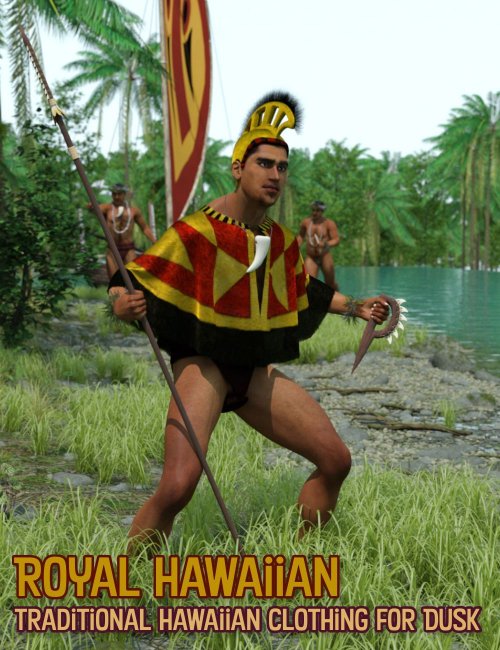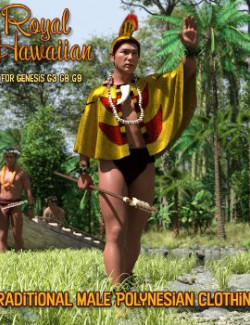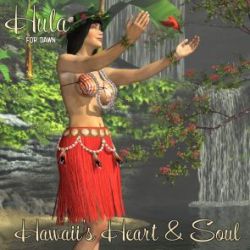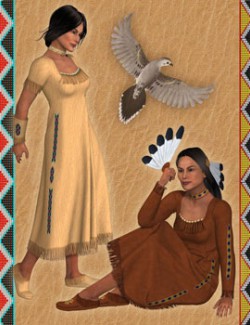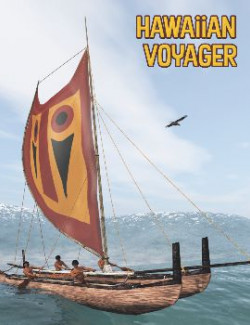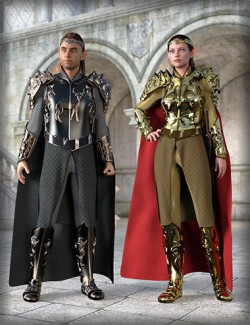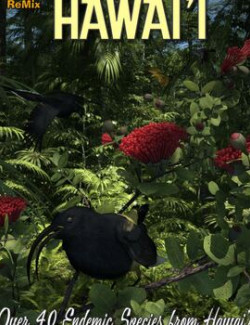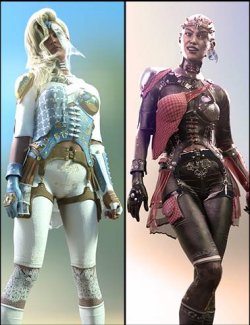Note: This product has been updated in January 2023 from its original 2015 version to include support for Iray and Superfly render engines, DAZ Studio's D-Force and a rebuilding of the product folder structure. It is recommended to delete the old version before installing this update.
Aloha. The island chain which now comprises the state of Hawaii was first settled by Polynesian explorers sometime between 800- 1000 AD. By the time the first Europeans made contact in the late 18th century, the native Hawaiians had established a rich and thriving culture which was strictly divided along caste lines. Social status was marked by what a person wore and this convention continued even after the arrival of Christian missionaries who forced their Western modes of dress on the native Hawaiians.
The pre-European dress included three distinct items; grass skirts, Kapa cloth garments and feathered attire.
Grass Skirts. Easily, the most identifiable symbol of Hawaii because of its association with traditional hula dancers, grass skirts were actually constructed from the outer bark and leaves of the banana tree. The skirt's waistband was tightly braided and fit the wearer snugly. Longer strands of fiber hung down from the waistband. Traditionally, the same fibrous material was fashioned into anklets and worn during ceremonial dances.
Kapa Cloth. This is also known as 'bark cloth' by Westerners or 'tapa' throughout the rest of the Pacific Rim. It was the material from which the most common articles of Hawaiian clothing were made. Traditionally manufactured by women, kapa cloth is made from the bark of the paper mulberry tree through a complex process which renders the bark into a pliable, felt-like fabric. Kapa cloth was often dyed or printed with bold, colorful patterns. The finished cloth was then fashioned into the 'malo,' the tucked skirt worn by men, or the 'pa'u,' the short skirt worn by women.
Feathered Attire. These items, worn by Hawaiian nobility and royalty, were constructed from a base of finely woven fiber netting and thousands of brightly colored feathers in a bold design. Lesser chiefs wore shorter feathered capes while kings and high-ranking officials wore longer cloaks. The feathered cloak of King Kamehameha was composed of approximately 450,000 feathers of the mamo bird. Each mamo bird only yielded about six or seven of the appropriate feathers. Thus the making of these Hawaiian garments led to the extinction of several species of birds.
The Royal Hawaiian set includes male traditional Polynesian clothing for the DAZ Studio and Poser Dusk male model. Included in this set is a Feathered Cape and Crown, a Kapa loincloth, necklaces and leaf/fern anklets, wrist and head bands.
This set has separate DAZ Studio and Poser versions and supports 3Delight, Iray, Firefly and Superfly render engines.
What's Included & Features...
Models (cr2/pp2/obj and duf):
* Kapa Loincloth
** Shaping and Adjustment Morphs
* Royal Hawaiian Feathered Crown
** Shaping and Adjustment Morphs
* Beaded Shell Necklace
** Shaping and Adjustment Morphs
* Flower Lei
** Shaping and Adjustment Morphs
* Whale-tooth Necklace
** Shaping and Adjustment Morphs
* Leafy Anklebands
* Leafy Wristbands
* Leafy Crown
* O'hia Lehua Crown
* Royal Hawaiian Feathered Cape
** Dynamic Cloth (Poser Version)
** G-Force Cloth (DAZ Studio Version)
Materials (mc6 and duf/dsa formats):
* Kapa Loincloth
** 6 Loincloth colors
*Feathered Crown
** 4 Preset combinations
** 4 Helmet Fin Colors
** 4 Ribbed Fin Colors
** 4 Feathered Crest Colors
** 4 Helmet Colors
*Feathered Cape
** 4 Cape designs
* Beaded Necklace
** 6 Bead Colors
* Flower Lei
** 3 Flower colors
* Leafy Wrist, Ankle and Head Bands
** Fern or Mixed Leaf materials
** Dark or Light Ties<
* O'hia Lehua Crown
** 5 Flower Colors
Illustrated PDF Manual on how to use the Product and a History of Polynesians Quest for Feathers.
Software: Poser 10+, Daz Studio 4+
Compatible figures: Dusk - Dusk S.E.
